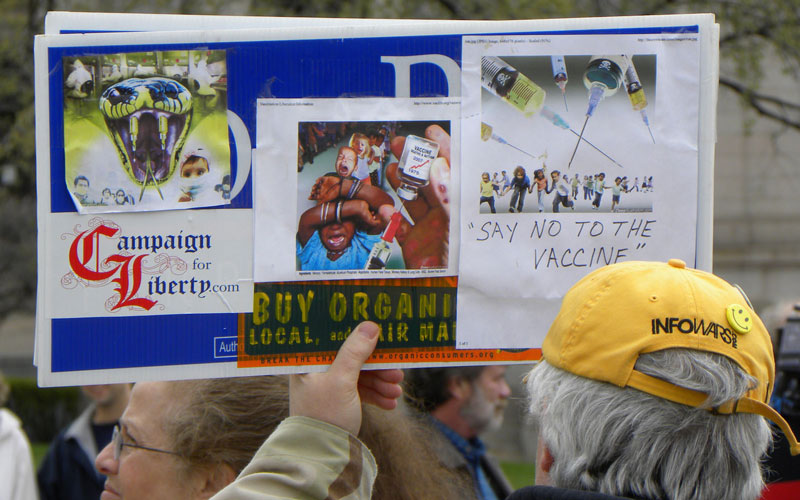
An opponent of mandatory vaccinations at a 2010 rally in St. Paul, Minn., makes his opinion known. (Photo by Fibonacci Blue via flickr/Creative Commons)
WASHINGTON – Renee Gentry is president of the Vaccine Injured Petitioners Bar Association, but she doesn’t tell people what she does for a living if she can avoid it.
“It takes about six questions to get me to say vaccine, because immediately it’s, ‘Oh, you’re not one of those crazy people are you?'” Gentry said.
A measles outbreak late last year rekindled the “anti-vaxx” movement, which began in the late 1990s after the publication of a now-retracted medical paper that purported to show a connection between autism and the measles-mumps-rubella, or MMR, vaccine.
The anti-vaccine voices, boosted in recent years by celebrities like Jenny McCarthy, have made it difficult for those who have seen the real but rare side effects of vaccines.
Vaccine injury fund tops $3.5 billion as patients fight for payment
Critics say vaccine injury fund has strayed from original purpose
“It’s really a polarized area,” Gentry said. “You are either on the side of right and good and babies or you’re Jenny McCarthy – and there’s no in between.”
She said she’s had clients with children who were injured by a vaccine, but who lie to friends and family members about what happened because they’re afraid of being labeled as “the anti-vaxxers and the crazy people.”
Drew Downing, a Phoenix lawyer who specializes in vaccine injury cases, said the anti-vaccine label is a “horrible misrepresentation for families who actually have children who are injured.”
“There is certainly a difference between just being anti-vaccine for the sake of being anti-vaccine because you disagree with government forcing you to do something – versus the situation where you have a medical, good-faith belief that vaccination caused some sort of condition in your child,” Downing said.
Gentry said the negative perception associated with the anti-vaccine movement, coupled with the desire to keep immunization rates up, has made it difficult to have open conversations about the real risks associated with vaccines.
It doesn’t make sense, she said, since people react to things like aspirin and penicillin every day. But “if they ask you if you’re allergic to penicillin, you just get a little band on your wrist and you’re fine. If you say you’re allergic to something in a vaccine, people lose their minds,” she said.
“If you truly want to be science-based, then vaccines are not magic Pez dispensers,” Gentry said.
“They’re not magic, they’re not miracles,” she said. “They’re very effective, incredibly necessary, man-made, for-profit pharmaceuticals – and they should be treated as such.”